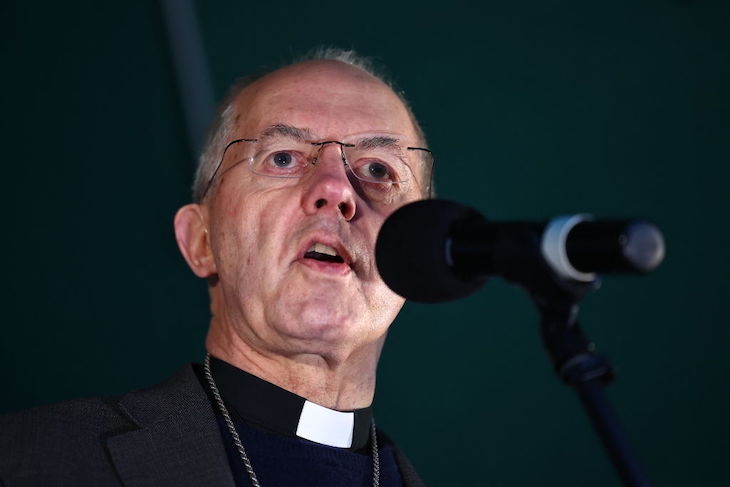Traditionalists in the Church of England and the Catholic church don’t, of course, always see eye to eye. But on the issue of gay marriage and same-sex relations they may have found some common ground.
In a landmark ceremony last week, the Church of England blessed a same-sex couple’s relationship for the first time. Prayers for two women – Catherine Bond and Jane Pearce – were held at St John the Baptist Church, in Felixstowe, Suffolk. As if by chance, this week we also heard about the same issue from the papal Dicastery, the Vatican body tasked with maintaining sound doctrine. Five conservative cardinals had submitted a dubium (i.e. awkward question) about whether blessings of same-sex unions were reconcilable with either scripture or church teaching.
Pope Francis’s answer was revealing. Pastoral charity, he continued, required us ‘not to simply treat as ‘sinners’ other people whose guilt or responsibility may be mitigated by various factors affecting subjective accountability.’ In other words, he declined to condemn such blessings. In substance he went further and gave them the go-ahead, a point made clear beyond doubt by the subsequent declaration from the Dicastery entitled Fiducia Supplicans dealing with the blessing of couples in ‘irregular’ unions. This was immediately picked up with unfeigned enthusiasm by organisations calling for LGBT advancement within the Church. Traditionalists were horrified, but they should hardly be surprised.
Educated Anglicans are not stupid
In all but name, it has been obvious for some time that Francis wants to initiate a change of doctrine; he has, for instance, been discreetly reaching out to encourage those, such as the Global Network of Rainbow Catholics, who do not like the Church’s attitude to same-sex attraction. As ever with the Catholic church, the quip remains true: a change in orthodoxy is as often as not introduced by the words ‘As Mother Church has always taught…’
The inconsistency of the Vatican’s position, however, is as nothing when you compare it to the stance of the Church of England on PLF, or Prayers of Love and Faith. The agenda of the faction that promoted PLF is obviously similar to that of Pope Francis: the introduction by the back door of an official blessing of same-sex unions, despite the unequivocal teaching of the Church on marriage and its official disapproval of sexual relations outside it. But leaving aside the doubts as to the legality of this (changes can only be introduced under canon B5 if they do not contradict doctrine in any ‘essential matter,’ and the bishops have steadfastly refused to reveal what legal advice they got on the point), as regards the Church of England the matter is much murkier.
A look at the guidance to the prayers for the blessing of a ‘covenanted friendship’ is instructive. True, the definition of such a friendship is a fairly typical Anglican exercise in vacuousness. It is apparently ‘not exclusive, yet deeply meaningful, particular, and seeking to grow in holiness,’ besides being available to those of the same or opposite sex, even if they are also married to others: something that may leave one wondering just what there is to bless here which could not be achieved by a blessing of the individuals involved. But one thing is clear: it is ‘by definition not sexually intimate.’
No doubt this phrase came in to placate orthodox Anglicans who otherwise would have seen a move towards recognising same-sex marriage. But the wording is clear: a committed same-sex (or opposite-sex non-marital) relationship that is sexual is outside the definition of a ‘covenanted friendship,’ and therefore not covered by the new dispensation. If so, it is a little difficult to see how a couple whose relationship is other than platonic can in honesty ask for a PLF blessing on it, or how a minister can in conscience use the new form of service to give the church’s imprimatur to a couple he knows are in such a relationship.
But this, one suspects, will not worry the high-ups in the church, many of whom (including the Archbishop of York) are childishly impatient with the church’s teaching on sexuality anyway. And the progressives, it seems, are quite cynical: the priest who conducted the Felixstowe proceedings was clear that he saw himself as striking a blow; the church, as he put it, has ‘come out of the closet’.
It’s hard to avoid the conclusion that, whereas the Catholic position on same-sex blessings is simply illogical, the Church of England practice goes further, and amounts to a pretty cynical exercise in theological and intellectual dishonesty. Educated Anglicans are not stupid. The result of these latest intellectual contortions will be, one suspects, that more and more of them will leave the church entirely or go to other sects which aspire to at least a semblance of integrity.






Comments